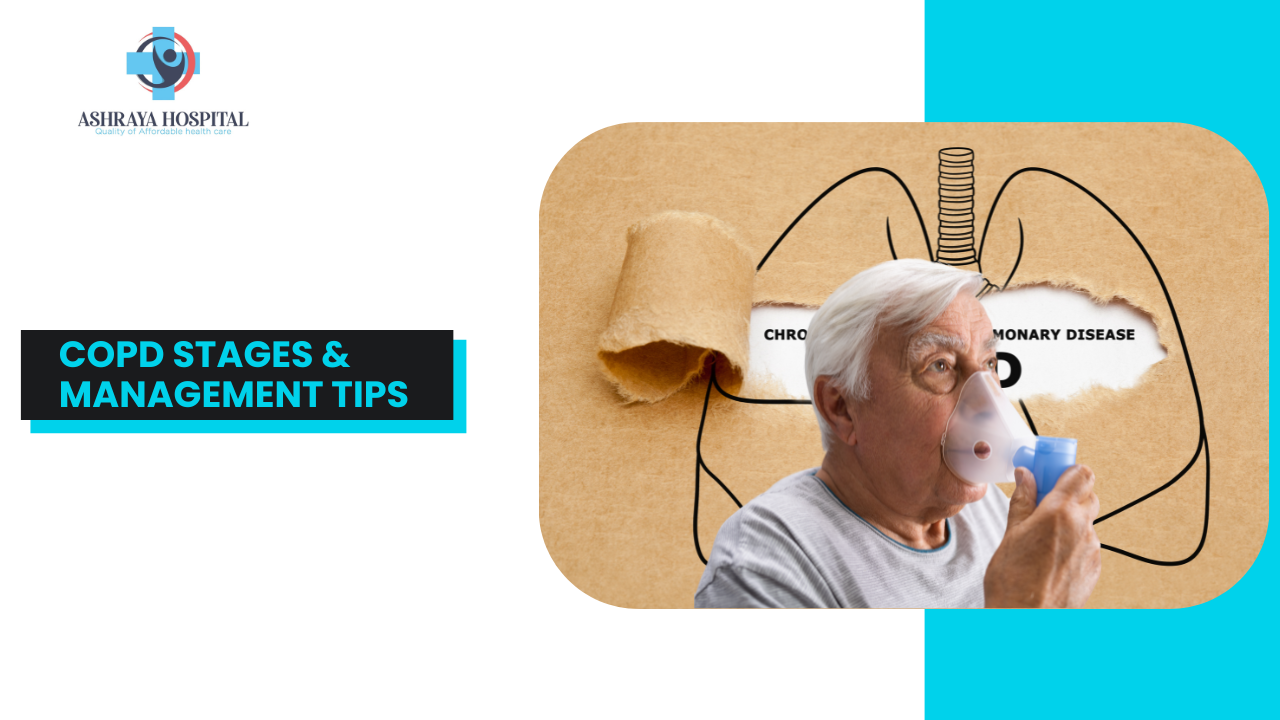



Chronic Obstructive Pulmonary Disease (COPD) is a progressive lung condition that makes breathing increasingly complex over time. Understanding the stages of COPD is essential, as it allows patients and caregivers to manage symptoms effectively and slow disease progression. While COPD cannot be fully cured, timely intervention, lifestyle adjustments, and proper medical treatment can significantly improve quality of life. This blog aims to explain the different stages of COPD, highlight their symptoms, and provide practical strategies for managing the condition at each stage, enabling patients to lead a healthier and more comfortable life.
For more information on COPD, its causes, symptoms, and prevention, make sure to check out our previous blog: Raising Awareness About Chronic Obstructive Pulmonary Disease (COPD). This will provide additional context on the importance of early diagnosis and how you can take action against COPD from the start.
Stage 1: Mild COPD (Early Stage)
Stage 1, or mild COPD, often presents with minimal symptoms. Patients may experience a slight cough, occasional shortness of breath, or increased mucus production. Many individuals may not even realise they have COPD at this stage.
Management & Treatment: Quitting smoking is crucial to prevent further lung damage. Doctors may recommend short-acting bronchodilators to ease breathing during flare-ups. Maintaining a healthy lifestyle, including regular physical activity and avoiding lung irritants, is vital.
Stage 2: Moderate COPD (Moderate Stage)
In Stage 2, symptoms become more noticeable. Shortness of breath may occur during routine activities, and coughing with mucus becomes more frequent.
Medications & Management: Doctors often prescribe long-acting bronchodilators, inhaled corticosteroids, or combination inhalers. Pulmonary rehabilitation can help improve lung function and teach patients effective strategies to manage breathlessness. Daily activities may require some adjustment, making early intervention essential.
Stage 3: Severe COPD (Severe Stage)
Stage 3 marks a significant decline in lung function. Patients may struggle with daily tasks due to persistent breathlessness and fatigue. Flare-ups, or exacerbations, become more frequent.
Treatment: Medication use becomes more intensive, and supplemental oxygen may be necessary. Regular check-ups with healthcare providers are essential for adjusting treatments, preventing complications, and managing exacerbations effectively.
Stage 4: Very Severe COPD (End-Stage)
Stage 4 represents the most advanced phase of COPD, with severe limitations in daily life and frequent hospitalisations.
Focus: Treatment prioritises symptom relief and quality of life. Long-term oxygen therapy, palliative care, and in some cases, lung transplantation may be considered. Patients require comprehensive support from healthcare professionals, caregivers, and family.
Stage 1: Mild COPD
Stage 2: Moderate COPD
Stage 3: Severe COPD
Stage 4: Very Severe COPD
Living with COPD can lead to anxiety, depression, and social isolation. Coping strategies include joining support groups, engaging in counselling, practising stress-relief techniques, and maintaining strong social connections. Family support plays a key role in adherence to treatment and improving overall well-being. Mindful breathing exercises, light physical activity, and hobbies can also help manage stress and maintain a positive outlook.
The Role of Healthcare Professionals in COPD Stage Management
Pulmonologists, respiratory therapists, and primary care physicians play a critical role in COPD management. Regular check-ups, personalised treatment plans, and a multidisciplinary approach help patients manage symptoms, prevent complications, and slow disease progression. Collaborative care ensures that patients receive the most appropriate interventions at each stage of COPD.
Recognising and managing each stage of COPD is essential for maintaining lung function and improving quality of life. Early intervention, lifestyle changes, and consistent communication with healthcare providers can slow disease progression and reduce the risk of complications. With ongoing care, patients can lead fulfilling lives despite living with COPD.
If you or a loved one is experiencing symptoms of COPD, it's essential to take action sooner rather than later. Contact Ashraya Multi-speciality Hospital and schedule a consultation with one of our experienced pulmonologists today. Early diagnosis and personalised care can make a significant difference in managing your condition, improving quality of life, and preventing further complications. Book your appointment now!